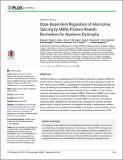Dose-Dependent Regulation of Alternative Splicing by MBNL Proteins Reveals Biomarkers for Myotonic Dystrophy
Author(s)
Wagner, Stacey D.; Struck, Adam J.; Gupta, Riti; Farnsworth, Dylan R.; Mahady, Amy E.; Eichinger, Katy; Thornton, Charles A.; Berglund, J. Andrew; Wang, Eric T; ... Show more Show less
DownloadWagner-2016-Dose-Dependent Regulation of Alter.pdf (3.229Mb)
PUBLISHER_CC
Publisher with Creative Commons License
Creative Commons Attribution
Terms of use
Metadata
Show full item recordAbstract
Alternative splicing is a regulated process that results in expression of specific mRNA and protein isoforms. Alternative splicing factors determine the relative abundance of each isoform. Here we focus on MBNL1, a splicing factor misregulated in the disease myotonic dystrophy. By altering the concentration of MBNL1 in cells across a broad dynamic range, we show that different splicing events require different amounts of MBNL1 for half-maximal response, and respond more or less steeply to MBNL1. Motifs around MBNL1 exon 5 were studied to assess how cis-elements mediate the MBNL1 dose-dependent splicing response. A framework was developed to estimate MBNL concentration using splicing responses alone, validated in the cell-based model, and applied to myotonic dystrophy patient muscle. Using this framework, we evaluated the ability of individual and combinations of splicing events to predict functional MBNL concentration in human biopsies, as well as their performance as biomarkers to assay mild, moderate, and severe cases of DM.
Date issued
2016-09Department
Massachusetts Institute of Technology. Department of Biology; Koch Institute for Integrative Cancer Research at MITJournal
PLOS Genetics
Publisher
Public Library of Science
Citation
Wagner, Stacey D. et al. “Dose-Dependent Regulation of Alternative Splicing by MBNL Proteins Reveals Biomarkers for Myotonic Dystrophy.” Ed. Gregory A. Cox. PLOS Genetics 12.9 (2016): e1006316.
Version: Final published version
ISSN
1553-7404
1553-7390